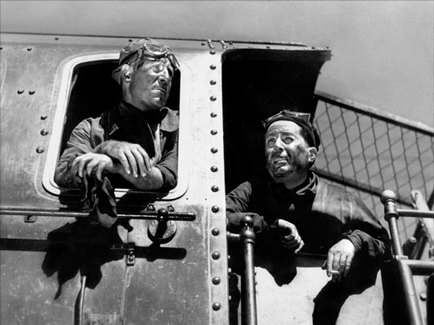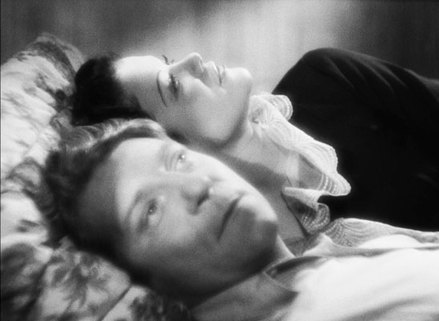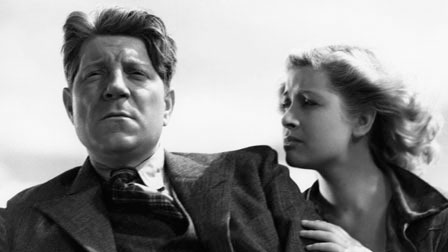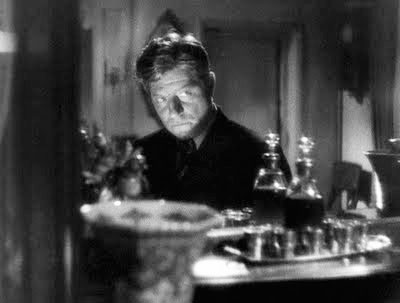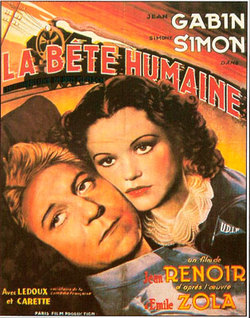
Jean Renoir's
La Bete Humaine
by Paulette Reynolds
January 29, 2015
La Bete Humaine
by Paulette Reynolds
January 29, 2015
Le Bete Humaine
(The Human Beast)
1938 * French
Directed by Jean Renoir
Screenplay by Jean Renoir and Denise Leblond
Starring Jean Gabin/Jacques Lantier, Simone Simon/Séverine Roubaud, Fernand Ledoux/Roubaud, Blanchette Brunoy/Flore and Gérard Landry/Le fils Dauvergne.
The French know about love. Famous for their extremes of the Apache dance and crime of passions, it's hard to watch an American film after viewing a French love story, especially a film noir. La Bete Humaine is one film noir that is difficult to ignore, because of the shifting passions, convoluted reasoning and incomprehensible cultural reactions.
It famously begins with the silence of two train conductors, Jacques and Roubaud, being lurched about, surrounded by the screeching of metal wheels of the train that they commandeer. Their actions indicate a long-time working relationship, where a few words will do instead of many. The ceremonial nature of the swelling music and views of shifting train tracks alert us to a common noir metaphor - that of destiny's inevitable pull from one safe path onto another, more dangerous one.
(The Human Beast)
1938 * French
Directed by Jean Renoir
Screenplay by Jean Renoir and Denise Leblond
Starring Jean Gabin/Jacques Lantier, Simone Simon/Séverine Roubaud, Fernand Ledoux/Roubaud, Blanchette Brunoy/Flore and Gérard Landry/Le fils Dauvergne.
The French know about love. Famous for their extremes of the Apache dance and crime of passions, it's hard to watch an American film after viewing a French love story, especially a film noir. La Bete Humaine is one film noir that is difficult to ignore, because of the shifting passions, convoluted reasoning and incomprehensible cultural reactions.
It famously begins with the silence of two train conductors, Jacques and Roubaud, being lurched about, surrounded by the screeching of metal wheels of the train that they commandeer. Their actions indicate a long-time working relationship, where a few words will do instead of many. The ceremonial nature of the swelling music and views of shifting train tracks alert us to a common noir metaphor - that of destiny's inevitable pull from one safe path onto another, more dangerous one.
Jean Gabin and Simone Simon play criss-cross lovers, Jacques and Severine, stuck in the middle of a triangle that neither one wants to be disengaged from. Simone's pretty pout is a beautiful counter-balance to Gabin's weary handsomeness, as they drift from one level of noir love to another.
"Here today, gone tomorrow", she coos, while enjoying a cuddle with Jacques, referring to a wish to free herself from her cumbersome husband. He looks at her agast, but then, she doesn't really understand the man she's bedding. After nearly strangling a former girlfriend (who shrugs it off with typical Gallic indifference) he's surprised to find that he can't carry out her little master plan.
And her other lover, Roubaud, could care less, as he's lost in the grips of a gambling problem, brought about in part by her careless infidelities and a grim secret that forever binds them together. The reader must forgive my sense of cultural frustration, as this first journey into a foreign film noir classic is seriously impended by my hard-core American sensibilities. After watching Jacques lie to protect a sex kitten he'd just met, knowing that a casual acquaintance will be frying for the crime, seemed quite a stretch, even for a noir film. But then again, c'est la vie.
The lovers are well-aware of their date with destiny, but in characteristic noir fashion, they're unable to extricate themselves from their chosen fate. What sets this masterpiece apart, however, is that this triangle of lost souls is bound by their actions more than their feelings, and they appear perfectly content with their choices as they spin towards destruction.
The lovers are well-aware of their date with destiny, but in characteristic noir fashion, they're unable to extricate themselves from their chosen fate. What sets this masterpiece apart, however, is that this triangle of lost souls is bound by their actions more than their feelings, and they appear perfectly content with their choices as they spin towards destruction.
In the final scene, Roubaud desperately hunts down Jacques, seemingly more upset by his best friend's end, rather than for the crime he's just committed. Crying on the same railroad tracks that brought them into this spider's web, no one seems the wiser.
COPYRIGHT 2012/2021. Paulette Reynolds. All CineMata Movie Madness blog articles, reviews, faux interviews, commentary, and the Cine Mata character are under the sole ownership of Paulette Reynolds. All intellectual and creative rights reserved.
